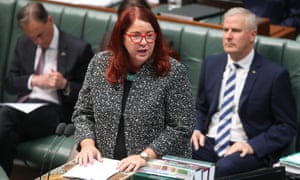Environment minister says she is ‘deeply wounded’ by Concetta Fierravanti-Wells’s remarks during tense ABC interview
Australia’s environment minister, Melissa Price, says she cannot
pinpoint the time when carbon emissions will come down but has
nonetheless expressed confidence the Morrison government has the right
policies to do the job.
Price, who has struggled since being appointed environment minister after the Liberal party leadership implosion, told ABC radio on Wednesday night the government was both reviewing some of its policies, and had the right policies, and “no one could pinpoint” when carbon emissions would come down during the at times tense interview with Patricia Karvelas.
On Wednesday Price was branded “an environment minister on L-plates” by fellow Liberal Concetta Fierravanti-Wells after a recent incident in a Canberra restaurant where three witnesses say she disparaged Pacific nations to the former president of Kiribati.
Fierravanti-Wells, who was the minister for international development and the Pacific before losing her frontbench post in the leadership turmoil, said Price’s encounter with the visiting Pacific official Anote Tong had “damaged” Australia’s good work and practical support for the Pacific.
Price told Radio National the Pacific was “a very good friend and
neighbour” and she intended to rebuke her government colleague after the
radio interview on Wednesday evening. “I’m going to be asking why would
you say these things … I’m deeply, deeply wounded.”Price, who has struggled since being appointed environment minister after the Liberal party leadership implosion, told ABC radio on Wednesday night the government was both reviewing some of its policies, and had the right policies, and “no one could pinpoint” when carbon emissions would come down during the at times tense interview with Patricia Karvelas.
On Wednesday Price was branded “an environment minister on L-plates” by fellow Liberal Concetta Fierravanti-Wells after a recent incident in a Canberra restaurant where three witnesses say she disparaged Pacific nations to the former president of Kiribati.
Fierravanti-Wells, who was the minister for international development and the Pacific before losing her frontbench post in the leadership turmoil, said Price’s encounter with the visiting Pacific official Anote Tong had “damaged” Australia’s good work and practical support for the Pacific.
It was pointed out to Price that emissions were currently rising in sectors of the economy apart from electricity, and the minister was asked whether or not the government intended to boost the emissions reduction fund – a vestige of Tony Abbott’s Direct Action climate policy. The ERF pays farmers and businesses to cut carbon dioxide pollution to below what it would otherwise be.
Price said topping up the ERF, which the government declined to do in the May budget, was a “matter for cabinet” but then volunteered the government was assessing whether the ERF should be broadened beyond its current scope to look after threatened species and their habitats. She argued projects supported by the fund “need to work harder”.
The Woodside Petroleum chief executive, Peter Coleman, on Wednesday joined mining giants BHP and Rio Tinto in calling for a price on carbon to help with emissions reduction targets and the transition to renewable energy.
Price rejected the call from business leaders from the resources sector, saying “this government does not support a carbon tax or a carbon price”. She said those policies could not be supported because they increased the price of electricity.
While Morrison government ministers claim Australia will meet our international climate commitments despite the absence of a policy roadmap to get there, the government’s own data tells a different story.
Emissions fell when the Gillard government implemented the carbon price later repealed by Abbott.
Asked when emissions would begin to trend in the other direction, given the minister’s confidence in the current policies, Price replied: “I doubt anyone could pinpoint the day they can reduce.
“No one can pinpoint that”.
Price said people had to look beyond current policies and consider future opportunities, like the development of the hydrogen sector.

No comments:
Post a Comment